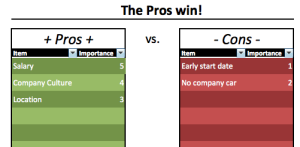
Not getting job interviews is no doubt one of the most frustrating experiences in life.
Consider this story.
A young teenager moves away from home to go to a big state school that promises prosperous opportunities and one heck of a college experience.
Though the parents are hesitant about their child taking on so much debt, they believe it will work out because the school has a great reputation. And the parents are proud to tell people that their kid got in and is moving on up in life.
The incoming freshman is slightly worried about the debt. But it doesn’t feel real to them because they assume they’ll make enough money soon after graduation that it won’t affect them in the slightest.
College is a blast. They make new friends. Date different people. Tailgate the big football games and cheer their team to victory.
The new freedom of having their own place, doing what they want when they want, and having no Friday classes feels like nirvana. They want to never graduate.
But time doesn’t stop for anyone. So after a few internships while in college, four years later they have to think serious about the work they’ll be doing after graduation.
They have a few ideas in their head of where they could see themselves working. And they know career fair is a nice opportunity where the company comes to them.
So they go there and hand their resume to as many people who will take it. The shotgun approach with no specific plan seems to be working.
That is until it’s clear the next week that it didn’t. They end up with no interviews, besides one at a bug exterminator company that they decline out of pride.
Putting the job search on hold, they finish out their last semester. And with no job offers, or even interviews, what results four years later is they’ve moved back in with their parents where the journey started.
Except now they have more debt on their shoulders than they can comprehend, are unemployed, and only have a fancy diploma to show for it.
Though college couldn’t have been more fun, each day that passes by without any career opportunities makes them doubt their decision to go to school. In the short-term, it seemed to pay off.
But now the real world was throwing them a stiff arm and their future looks bleak.
That’s roughly a true story of a few buddies of mine from college. And it’s tragic enough that this happens to some people I know.
It’s a crisis that thousands of students and young adults across the country are stuck with no job interviews, which turns into little to no hope about their future.
Deflating is often an understatement to describe how they feel. Most of the time it can be downright depressing when you put effort into your resume and cover letter, but don’t get called back for an interview.
Now let’s look at yourself in the mirror.
Whether you’re in school, freshly out of school, or a decade out of school, can you avoid a job search black hole? If you’re experiencing it now, can you get out of it? Or if you’ve got a job but you know it’s not exactly for you, do you have any power to find a better job?
Essentially, are you in control of your job search and career destiny? I’m about to answer that.
Are You In Control?
The question of, “Are you in control of your job search success?” all depends on how you view and approach the job search.
With what I know now, I’d say you’re definitely in more control than you think. And I have evidence to back it up.
From my research, personal job search, my book The Golden Resume, the success stories from my book, and other people I’ve coached, it’s clear to me that there’s a system to winning job interviews and offers.
Overall, recruiters, hiring managers, and companies don’t change much in what they’re looking for in an applicant—regardless of company, location, industry, or the individual decision-makers involved.
Meaning once you have a good idea of what they want, you will succeed the rest of your career. And that means these people are in control.
However, if you don’t know the ins and outs of how to win over a company so they offer you interviews and the job (instead of hundreds to maybe thousands of other applicants), then yeah you’re screwed. You have no control.
With this mindset, people believe their application all comes down to luck, coincidence, karma, or whatever word you use to feel better about yourself.
At least those who don’t have a strategy prove themselves right that they’re employment is out of their control.
Because the job interviews and offers won’t be coming your way if you suffer from this #1 problem many candidates struggle with, and don’t even know it.
Here’s Your #1 Job Search Problem
I believe the number 1 problem most candidates have is they look at the job search through the wrong lens.
What I mean is they think the job search is about them. All of their actions come from their own perspective. (This article lists that as one major and common mistake.)
For example, they look at writing their resume with the idea to cut corners and save time. So they write all their work experiences in chronological order, don’t add specific keywords, and only submit one general resume to every job they apply to.
They receive short-term pleasure from filling out a resume and applying. But since they don’t put in the full time and effort it takes to write a masterpiece that will actually win interviews, their resume doesn’t produce results.
This also explains why the majority of applicants don’t write thank you notes after the interview. It takes away from their time.
And the reason the lazy approach doesn’t work is it doesn’t cater to what the hiring managers at the company they’re applying to want.
Most resumes you’ll see, maybe yours included, are bland and just summarize what the applicant has done over the past 2 to 5 years or more. That’s not inspiring or interesting.
Many recruiters and hiring managers are busy and picky people. If you don’t prove that you got the experiences, skills, and personality to provide value to their team, and don’t prove it immediately with your resume, it’s goodbye to you.
Employers aren’t specifically looking for what you’ve done, they’re looking at your resume from the perspective of what have you done that proves you will be successful for their company. If it’s not immediately clear, then your resume is rejected for someone who communicates that better.
That’s why the job search is a game. And those who know how it’s played, recognize that they need to do everything with the hiring manager in mind, not themselves.
To summarize this point, the #1 problem many applicants have is they think the job search is about them. And this is the exact reason they’re not getting job interviews.
Why The Job Search Is Not About You
While technically the job search is about you—that’s why you’re applying —you have to have the mentality that it is all about the company.
If you don’t, you’re not going to be successful.
And this is why you have to swallow your pride and only think about them: Because they have what you need—a job, salary, benefits, opportunities, and other things you want.
They have the leverage in this deal. They have the power. So act like it. (Now once you get an offer, then the tables might turn where you have some leverage to negotiate your salary.)
When a company holds your dream job, if they ask you to jump, you should say how high?
You shouldn’t say this is who I am, take it or leave it. If you treat the employer like they should bend to you, they’ll leave it. Who do you think you are? You’ll never win with that approach.
Plus, if you think it’s such a great job, odds are other people do too. Which means the competition will be fierce, maybe with hundreds or thousands of applicants all wanting one job.
For example, Google gets 2 million applications, and other giants like Amazon and Nike are known to get crowds of applicants for some jobs.
If you don’t present yourself in the shape of what these employers want, good luck getting an interview—let alone a job offer.
So you have to bring it when you want any job, especially an intensely competitive one.
And since the odds are not in your favor to begin with, you need to target your resume, cover letter, interview answers, and every interaction to the company.
That’s the only way to shine the light on the idea you’re the candidate they want, otherwise they miss the message and pick someone else.
The Golden Resume
Since my freshman year of college, I committed myself to having great opportunities after graduation. I figured where’s the freedom in life you only have one path to go.
I wanted options so I could evaluate the career opportunity, potential growth, salary, benefits, location, and feel, and pick the job offer that best suited me.
And I accomplished my mission of having multiple appealing job offers, but only after four years in college of experimenting, studying, learning, and practicing the method that wins competitive job offers.
It took a ton of work and focus to narrow down what makes the difference between losing and winning in the job search.
However, you don’t have to put in four years to get a job you love. You can get it in the next month, maybe the next week. Here’s how.
I want to hand you the exact step-by-step system I used to not just get tons of interviews, but also multiple job offers at top Fortune 500 companies. That’s why I spent the last five months putting together my book The Golden Resume.
This course takes a different look at the job search than most people. And it for sure gets much better results than most people. The strategy in The Golden Resume is proven. I know it works based on my job search and other people I’ve coached—there’s no doubt about it.
Everything in here will help you persuade recruiters and hiring managers that they have to interview you or they would be a fool.
You will finally stand out and get to pick the job you want, instead of settling for what’s left.
Bottom line, if you know you’re not happy at your job then you should look into this book. Because you deserve to be happy at work. When you feel good about your job, you’re going to perform the best.
So why hold yourself back from your own happiness?
To learn more about how to get a job you’re passionate about, visit here.


